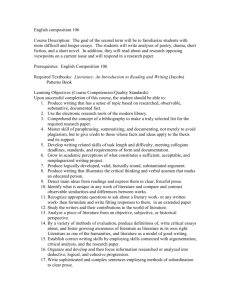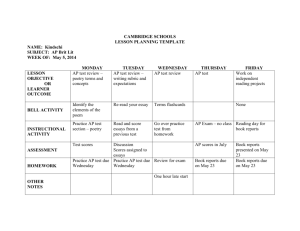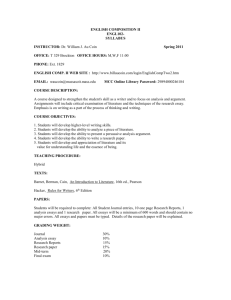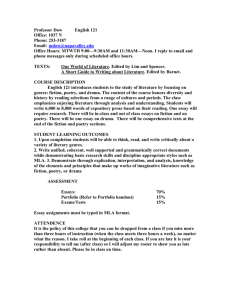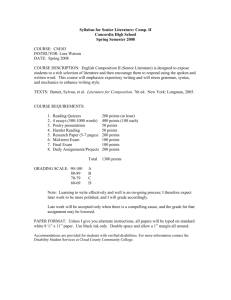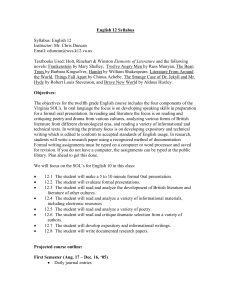Advanced Placement English Lit and Comp
advertisement
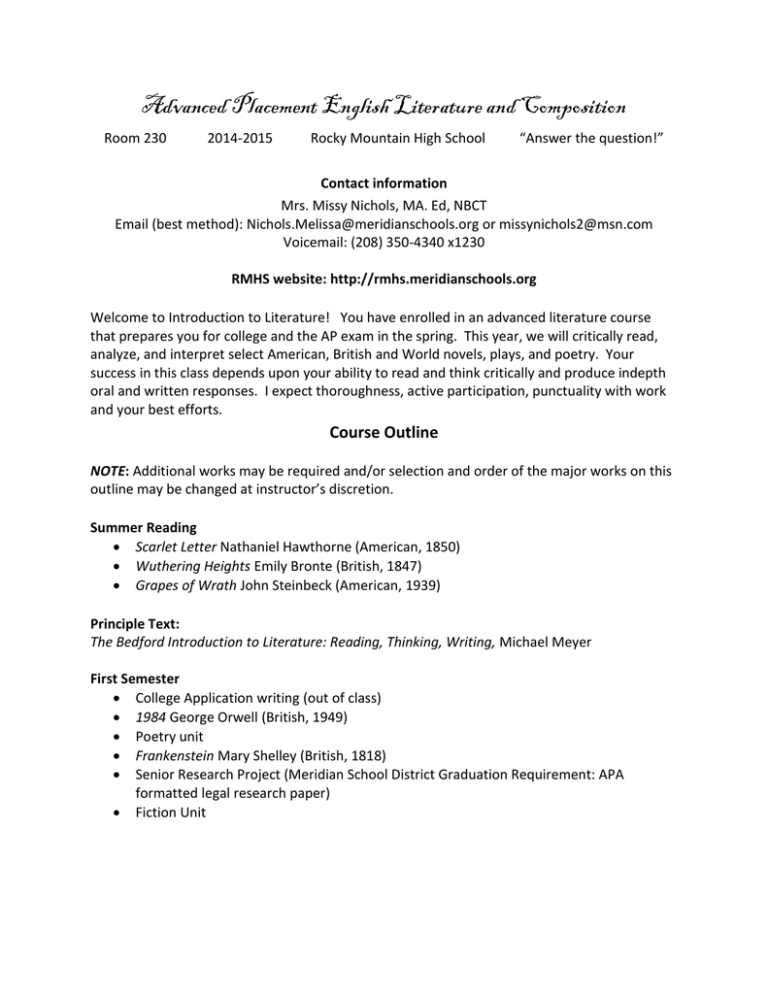
Advanced Placement English Literature and Composition Room 230 2014-2015 Rocky Mountain High School “Answer the question!” Contact information Mrs. Missy Nichols, MA. Ed, NBCT Email (best method): Nichols.Melissa@meridianschools.org or missynichols2@msn.com Voicemail: (208) 350-4340 x1230 RMHS website: http://rmhs.meridianschools.org Welcome to Introduction to Literature! You have enrolled in an advanced literature course that prepares you for college and the AP exam in the spring. This year, we will critically read, analyze, and interpret select American, British and World novels, plays, and poetry. Your success in this class depends upon your ability to read and think critically and produce indepth oral and written responses. I expect thoroughness, active participation, punctuality with work and your best efforts. Course Outline NOTE: Additional works may be required and/or selection and order of the major works on this outline may be changed at instructor’s discretion. Summer Reading Scarlet Letter Nathaniel Hawthorne (American, 1850) Wuthering Heights Emily Bronte (British, 1847) Grapes of Wrath John Steinbeck (American, 1939) Principle Text: The Bedford Introduction to Literature: Reading, Thinking, Writing, Michael Meyer First Semester College Application writing (out of class) 1984 George Orwell (British, 1949) Poetry unit Frankenstein Mary Shelley (British, 1818) Senior Research Project (Meridian School District Graduation Requirement: APA formatted legal research paper) Fiction Unit AP poetry, prose & open pr ompts; AP multiple choi ce Nichols 2 Second Semester Senior Research Project (Meridian School District Graduation Requirement: APA formatted legal research paper) Drama: Hamlet William Shakespeare (British, 1603) Poetry unit II The Stranger Albert Camus (French, 1942) The Joy Luck Club Amy Tan (American, 1989) Review and prepare for AP exam: poetry, prose & open prompts; AP multiple choice Course Requirements and Policies Attendance policy Students must be in their seats, workstations, or assigned areas, and prepared to do the work for class at the beginning of the period. A tardy becomes a “tardy late” when the student enters after 15 minutes of the class time has expired. Policy on academic honesty Rocky Mountain High School expects honesty and integrity from all its students. Always submit work that represents your original words or ideas. If words or ideas used in class assignments do not represent your original ideas or words, you must cite all relevant sources. All acts of cheating on assignments (roving eyes, cheat sheets, open books during tests, talking during tests), plagiarism (as defined by instructor), forgery of signature, and falisfication of data will result in: 1. Parent conference, grade of “F” on assignment, referral 2. Second offense will result in student being dropped from the course with an “F”. (Refer to “Cheating and Plagiarism Contract” for complete details) Policy on late and make-up work It is the student’s responsibility to make up all missing work due to excused absences. For each day a student has an excused absence, the student may turn in the missing assignment(s) and receive full credit. Students who are truant may not make-up class assignments for each day they are truant. Late work policy if student is not absent: Homework may be turned in one day late for half credit. Ten percent will be deducted for each day late on all essays and major assignments. Ten percent will be de ducte d for each day late on all essays and maj or Gradi ng policy Grading policy Grades are based on the total points earned by the student each semester. 90-100%=A; 80-89%=B; 70-79%=C; 59-69%=D; 58% or less=F Nichols 3 AP English Notebook Students must keep all assignments and handouts in a three ring binder specifically designated for AP English Lit and Comp. Notebook assignments will be collected and evaluated every two or three weeks. The first header will be CLASS HANDOUTS, the second WRITING, the third NOTES, the fourth TEST PRACTICE, and fifth VOCABULARY. Six remaining dividers will pertain to senior project. Please purchase these and we will label when we begin. Participation Active participation is an important part of this class. Participation credit can be earned through questions and comments in class discussion and by helping with classroom tasks (20 pt. grade each GP; 60 pts. for sem.) The AP Exam All students taking the course are strongly encouraged to take the AP English Lit & Comp Exam in May. The priority of instructional time in this class is given to preparation for the exam. Attentive behavior and comprehension of instruction will result in a passing score on the exam. Overview of Course Procedures Agendas, Due Dates, and Specific Assignments for Formal Critical/Analytical Papers You will regularly receive instructor generated agendas that will cover a three to four week period. The handout will include: specific due dates for chapters and/or poems, dates for timed in-class essays, and due dates for Formal Critical/Analytical Papers. You will be given detailed handouts and rubrics Formal Critical/Analytical Papers. Reading Assignments We will read at least 8 major works, both novels and plays, and approximately 30 poems. For novels and plays, students will complete “Questions, Quotes, and Notes (Q, Q, and N) unless told otherwise (see directions near the end of this document). Students are expected to complete all assigned reading and be prepared for class discussion. During the course of the year, we will engage in-depth analytical reading, also known as close reading. Students are expected to annotate/ write margin notes and/or keep separate notes as they read, paying careful attention to details, such as rhetorical features, structure, themes, motifs, style (diction, imagery, tone, figurative language), and the social and historical contexts and values expressed in the texts. Writing Assignments Writing Instruction During our year together, we will discuss the features of effective writing. A wide variety of writing instruction will be provided, including discussion and handouts on logical patterns of Nichols 4 organization; instruction on balancing general analysis with specific, concrete support; and effective use of rhetoric. We will also cover the essentials of MLA and APA format in detail, including parenthetical citation, use of quotations and the Works Cited page. These concepts will be reinforced through lessons and discussion throughout the year. Writing to Understand Students will have opportunities to demonstrate their understanding of the works and activate their prior knowledge. These assginments will typically be informal, such as freewrites, reading journals, and brief collaborative exercises completed in class. Timed Writing Students will write at least one timed essay in each two week period as we progress toward the AP exam. The vast majority will be past AP English Literature prompts: poetry, prose, and open. Some instructor designed prompts will also be included. For example, after our dicussion of Hamlet, you will be given an exam where you are given three prompts and will select only one as the basis for your composition. AP prompts will be graded on the 9 point scale. You will be given a generic 9 point rubric at the start of the year; I will discuss and explain the rubric indepth; I will also provide the specific rubric for the specific prompt when available. We will frequently examine sample student essays and engage in mock scoring sessions. Formal Critical/Analytical Papers: Writing to Explain (Expository) and Writing to Evaluate Students will write three typed, revised critcal/analytical essays (3-5 pages) and one major typed, revised analytical research paper (6-8 pages). It is my contention that the majority of college level writing is persuasive. As a result, the key to successful essays for this class is a clearly articulated position that the writer sustains throughout the paper supported by specific evidence from the text(s). For each critical/analytical paper, students will receive a detailed handout with specific instructions, including a scoring rubric specific to the essay. A rough draft will be required; we may complete in-class peer review of essays. The completed essay will receive substantial teacher commentary on the text, an end note, and a marked scoring rubric indicating successful elements and areas for improvement. Revision of graded essays and research papers: All essays scored “D+” or lower MUST be revised; revision optional for essays scored “C-“ or better (see detailed “Essay Revision Directions” at the end of this document). Class Discussion/Participation We will actively engage the material throughout the year via class discussion. I often begin the day with a brief lecture, framing essential questions for the lesson. On many days, I will also address some issue related to the features of effective writing. After that, we will move to Nichols 5 active discussion, using a series of questions and answers modeled on the Socratic method. Students will be asked to make assertions and claims about the material and support with specific textual details and quotes. Since your homework will primarily consist of formulating questions and locating quotations and details, all students should be ready for class discussion. I frequently call on students for responses to specific questions whether or not they have their hands raised. Be prepared. Approximate Schedule for Semester 1: Ongoing Classroom Routines: Weekly Vocabulary Quizzes and Instruction: Every week students will be quizzed on a list of 10 words. These words are derived from the literature studied at the time and are representations of common language on both previous AP exams and in reading selections provided by both ACT and SAT. The weekly quiz will require students to listen to the word pronounced, spell it correctly, provide a definition of at least three words (none of which can be a variation of the word), and use it in the one sentence structure of the week: complex, compound, compound/complex, loose, periodic, balanced, chiasmus, asyndeton, polysyndeton, anaphora, epistrophe, and parallel structure. Instruction regarding one sentence structure will be provided every week. Voice Lessons: Nancy Dean’s Voice Lessons provides strong instruction in creating strong syntax, detail, diction, and tone by emulating the qualities of strong authors. Regularly, students will practice sentence styles for the purposes of developing these devices in their own writing. Weeks 1-3: Relationship between the Reader and Text (1984 – George Orwell) Prior to class, students will prepare an annotation of the text in QQN format as noted below. Close reading of specific passages will occur in class. Socratic discussion will take place in preparation for an analytical writing piece which contains an extended interpretation. This first writing assignment will require students to demonstrate how the author’s technique and style convey his cautionary message to his current society and those to come. Through classroom writing workshop, students will practice persuasively supporting a thesis with textual detail and analysis. Upon completion of essays, in addition to teacher commentary and feedback, students will peer-evaluate several writing samples according to an AP rubric. Weeks 4-7: Poetry Week 4: SOAPSTone: Students will become familiar with the basic elements of poetry through the SOAPS model. The speaker, occasion, audience, purpose, style, and tone(s) of a poem are all components that help the reader understand purpose and meaning. Poems used throughout this week include: Sylvia Plath’s “Mirror”, Andrew Marvell’s “To His Coy Mistress”, Marge Pierce’s “The Secretary Chant”, and Robert Browning’s “My Last Duchess”. Week 5: Symbol, Imagery, Allegory, Irony: Poems used throughout this week include: Anne Bradstreet’s “The Author to Her Book”, William Wordsworth’s “The World is Too Much With Nichols 6 Us”, John Keats “Ode to a Nightengale”, and Robert Frost’s “Acquainted with the Night”. Week 6: The Sonnet : Students will study the impact the structure of poetry has on the audience. Poems used throughout this week include: Shakespeare’s “Shall I Compare Thee to a Summer’s Day?”, Edna St. Vincent Millay’s “I Will put Chaos into Fourteen Lines”, Seamus Heaney’s “The Forge”, and Mark Jarman’s “Unholy Sonnet”. Student reflections will be kept in a journal. Week 7: Writing about Poetry: To begin, students will be given an AP writing prompt to discuss in small groups for clear understanding and interpretation. Students will then create a rubric specific to the prompt after being given several writing samples of 8-9 papers to an AP writing prompt. Students will highlight and annotate these excellent papers for strong vocabulary use in discussion of literary device and as academic language. This language is to be modeled in their next papers. Soon after, a complete array of writing samples will be given to be scored in a mock scoring session positioning students as AP graders. Similarly, students will write to yet another prompt in pairs practicing both convincing argumentation about the poem and strong diction. Finally, on the last day of the week, students will write to a poetry prompt. Since it is a timed writing piece, afterwards, students will revise for sentence structures and diction. Weeks 8-10: Evaluating Effectiveness: Style, Diction, Author’s Purpose (Frankenstein, Mary Shelley) Throughout Frankenstein, students will evaluate the effectiveness of vocabulary for specific audiences. Students will consider effects of diction and sentence structures. Students will practice writing with Shelley’s voice for their own intended messages. Argumentative essay assignment: Frankenstein has been criticized as an immature work of Mary Shelley’s because of the unrealistic scientific model she uses. Support or discredit this notion of immaturity in an argumentative essay which draws upon textual evidence that measures Shelley’s artistry and quality of detail to portray meaning. Students must contend for or against the use of the imagination for the sake of literary effectiveness. Weeks 11-14: Fiction Kate Chopin’s “Story of an Hour”, William Faulkner’s “A Rose for Emily” and Ernest Hemingway’s “A Soldier’s Home” will all serve as springboards for the studies of character type, patterns in story form, development of tension and conflict, and the importance of setting. In small groups, students will select an author to study from one of the following: Thomas Hardy, Herman Melville, James Joyce, Anton Chekhov, and Katherine Mansfield. Groups will research the authors and at least 5 of their short stories. Groups will present prevailing themes, story types, and author style as demonstrated through specific examples to the class. Weeks 15-18: Cultural and Historical Impacts of Literature (Heart of Darkness, Joseph Conrad) Prior to reading, students will conduct group presentations regarding imperialism, colonialism, geography of the Congo, King Leopold, and Joseph Conrad’s life. During reading, students will Nichols 7 annotate according to an assigned task: images and symbols of hearts and darkness, the physical and psychological journey of Marlow, character shadings of Marlow and Kurtz, or an analysis of situational, verbal, and dramatic irony. After reading, students will write an essay that demonstrates how the work illustrates social attitudes, morals, spirituality, beliefs, and or customs of the time. Students papers should prove literature is a reflection of an era in history and a people as a culture. Being one of the more difficult works, these Heart of Darkness papers will undergo individual conferences with the instructor during the drafting process to ensure accurate interpretation and to encourage revision for apt and specific diction, strong and specific textual evidence, and engaging sentence structures. Approximate Schedule for Semester 2 Weeks 1-4: Senior Project Research Writing Senior Project is a corporate graduation assessment that shares tasks among both English and Government. Students are required to research a law including the law’s components, history and background, current situation, and differing viewpoints. Ultimately, students must determine the law’s effectiveness, and political and economic feasibility. An annotated bibliography in APA format must be completed. Weeks 3-6: Elements of Drama; The Tragic Figure (Hamlet, William Shakespeare) The class read of Hamlet will take place in the classroom to emphasize and evaluate the effects of drama as performed live. Specific passages will undergo annotation and close reads. Students will explore the classical depiction of a tragic figure including the tragic flaw and an author’s tragic vision for the work. Furthermore, students will study the archtypical search for identity a struggling character encounters. The unit will culminate with a practice prompt about the author’s tragic vision. Weeks 7-11: Models of Literary Thought (The Stranger, Albert Camus; The Joy Luck Club, Amy Tan) Elements of Feminist, Immigrant, Existential, and Absurdist literature will be discussed and explored. Translation of the human condition and struggle from culture to culture will further be addressed. Students will debate the effectiveness of conveying messages through each of these different genres various means. Weeks 12-13: Poetry Greater emphasis on structure, form and lesser discussed poetic devices will be used during this poetry unit. Students will be given a packet of poetry to choose from in order to team-teach these concepts to the class after being assigned poetic devices to teach. Weeks 14-16: AP Exam Preparation Students will take multiple choice exams individually and in small groups. Discussion and argumentation for correct answers will occur in both small groups and whole class discussion. Nichols 8 Strategies for taking the exam will be taught. Free-response questions for the Poetry, Fiction, and Open prompts will be given and scored in general (according to the rubric) and specifically (a class set of notes will be distributed regarding common misreads and common accurate interpretations). Students will review writing samples of effective and ineffective papers from AP. Weeks 17-18: Timelines of Literary Thought In small groups students will generate digital timelines that depict the literal, figurative, and interpretive meanings of texts as they have impacted societies from the 1600s to modern times. Presentations will occur on the last day of school as all students will not select the same literature as basis for their research. Directions for Questions, Quotes and Notes (Q,Q, & N) Questions about the book. “Quotable quotes.” Select quotes that provide insight into the text, that you are curious about, or otherwise capture your interest. Record page # and reason for choosing. Class Notes and a recommendation Required: Take substantial notes on classroom discussion. Strong note taking skills are critical for academic success. Write questions about the novel for class discussion. Think of interesting or thought provoking questions for your peers and instructor to explore in depth. Recommended: Buy your own copy and annotate the text or keep reading notes. Focus on key themes, characters, symbols as you read.
